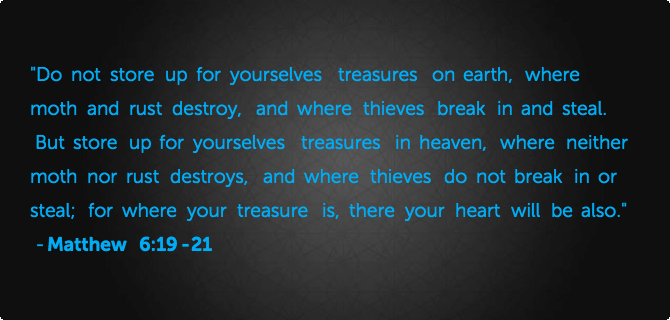
“Do not store up for yourselves treasures on earth, where moth and rust destroy, and where thieves break in and steal. But store up for yourselves treasures in heaven, where neither moth nor rust destroys, and where thieves do not break in or steal; for where your treasure is, there your heart will be also.” – Matthew 6:19-21
Warren Buffett is probably one of the most admired investors in America. Certainly, it’s hard to argue with his extraordinary success. One of the things that Warren Buffett is known for is his long-term view on investing. Not one for quick investments to make the cash and move on, he believes in a more conservative, long-term view that tends to stick with blue chip companies.
But even Warren Buffet looks like a day trader compared to Jesus’ view of long-term investments. Jesus’ view is radically counter-cultural to anything that we see in our materialistic world. Bottom line, Jesus says, “I want to talk to you about a worry-free investment that has no risk. You can never lose it.” [My translation of Matthew 6:19-21]
In the ancient world, there were three main ways to evaluate wealth. One was based on precious metal; another, precious spices; and still another had to do with clothing, because the average person would have one set of clothes. Only the wealthy had more than one set of clothes. So here, Jesus is telling them (and us), “Don’t store for yourselves treasures on earth! Those treasures will become ruins.”
What a contrast that is with the modern world. Let’s try to get a worldwide perspective about this. In Andy Stanley’s new book, How to be Rich*, he says that if an American is making over $37,000 a year, that makes him/her wealthier than 96% of the world’s population! I realize that in today’s culture, making $37,000 wouldn’t be considered wealthy, but compared to the world, it does. It’s hard for us to fathom.
The big question is—do you believe what Jesus has to say about your treasures – your money and investments – or do you not? I don’t know if there can be a more convicting verse than Matthew 6:21: “Where your treasure is, there your heart will be also.” Ask yourself this question: “If Jesus looked at my checkbook, my house, my cars, my clothes, and all I spend on ‘things’ versus what I give to God, what would He say? Where would He say my heart is?”
Our checkbooks don’t lie. How we spend our money reveals a lot about who we are. It reveals our hearts. Are you investing in heavenly treasures? Are you growing closer to Christ? Are you giving of your time, your talents, and your financial resources to build up the body of Christ? What are your treasures? Where is your heart?
*How to be Rich, Andy Stanley, Zondervan 2013






